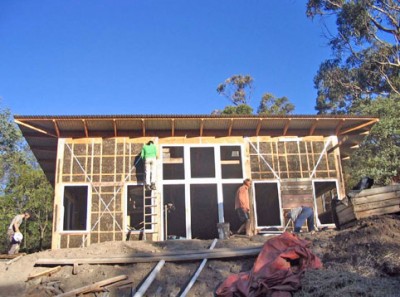A group of young people has answered the challenge to live in a more sustainable manner by securing University support for a community food growing and marketing centre, The Source Wholefoods. [13 January 2009 | Peter Boyer]
After years in the wilderness (literally), sustainability has suddenly become all the rage. Over the airwaves, down the internet lines, on billboards, in magazines – everywhere – people, corporations and governments want to be seen to be green.

Volunteers putting treated straw bales in place before applying render to the Sustainability Centre, University of Tasmania PHOTO JENNY CALDER
Everyone – well, nearly everyone – seems now to accept that it’s good to use less electricity and to drive a car as little as possible. Growing numbers of people know it’s good for the planet to insulate their homes, to buy only the things we really need and to eat more local food.
This is good news, but it appears something is getting lost in translation. Our minds don’t seem to be able to pass on to our “doing” bits – our hands, our legs, our bodies – that thinking about a problem is only the first step to solving it.
Among those who have gone out and walked the talk are some of the people who’ve always done so – the farmers who get their hands dirty so that we can have food on the table. A few farmers have come to appreciate the unsustainability of our food production and distribution systems.
Despite cost pressures, and often against all the advice of peers and officialdom, they’ve begun to shift their farms toward more diverse, more natural systems that avoid artificial chemicals. We must look after these people, because they will play a big part in a sustainable future.
In urban areas, community vegetable gardening groups are springing up in the suburbs, but a group of young people based at the University of Tasmania’s main campus has set out to take this basic idea a few steps further, with financial help from the State government and the university.
“The Source” seeks not only to grow food, but to change the way its university and wider communities think about the way we live – and in the process to celebrate the good things of life. On a disused piece of university land running down to Proctors Creek, the group is creating a demonstration and teaching site for sustainability.
Guided by landscaper and gardener Hannah Moloney, vegetable plots and fruit trees will be planted during this year. To provide a social focus for groups building and using the facility, students have already built a wood-fired oven, and this summer a team is building pathways and outdoor seats.
The Source is situated next door to the Tasmania University Union with its student eateries, so it has access to a lot of food waste that until recently has just added to our greenhouse gas problem by going to landfill.
Now, thanks to the forethought of Source co-founder Jenny Calder and the TUU Environment Collective, it’s going to help grow new food, via a new purpose-built green waste facility installed by local composting guru David Stephen.
If there’s a hub for this multi-faceted organisation, it’s the Sustainability Centre, a newly-constructed building made with timber, mud and straw bales which will house the Source Community Wholefoods store and provide a venue for teaching sustainable living.
The centre was built with support from the Tasmanian Community Fund grants scheme last year, using voluntary labour. It’s now having its final coats of render applied and will be ready for use early in the new academic year.
The Source is one shining example among many of the potential in our communities to get our lives, and especially our food production, back on to a sustainable footing. Let’s hope that with increasing community and government support, such lights will continue to shine, ever brighter.
